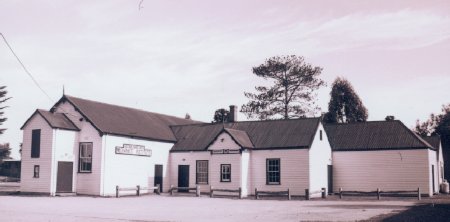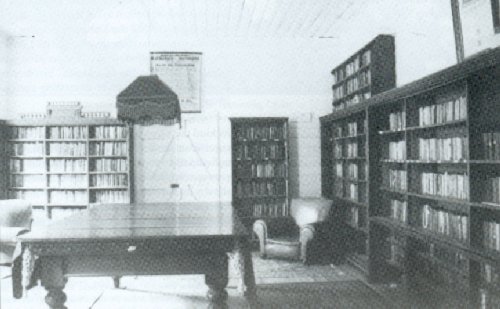
Briagolong
Mechanics' Institute
========================================================================
UNDER CONSTRUCTION
Please call back soon for interior photographs and more details of the Library.

Briagolong Mechanics' Institute, before the addition of the Community House wing to the right
Mechanics' Institutes were places of learning for the "working man" or "mechanic", someone who worked with his hands. Libraries, lectures and debating societies were important components of early Institutes. This photograph, above, was taken before the addition of a wing for the Community House in 1998. With that wing, this important and beautiful old institute returned to its original roots - providing education for its community.
The first part of the building was built in 1874, and is incorporated within this building, still with its shingles on the roof. The Institute houses a large and original library, with the last book being added in 1956. It has officially been recognised as the most complete example of an early Mechanics' Institute library in the state. It includes many early farming textbooks, books in Gaelic and works of science and philosophy.
~~~~~~~~~~~~~~~~~~~~~~~~~~~~~~~~
The Briagolong Mechanics' Institute Library
Adam Bowden

From 1874 when the building first opened, to 1962, the Briagolong Mechanics' Institute offered a library service to local residents. As many people in Briagolong know, this collection of literature, still largely intact, has not been available to the public for quite some time and the prime interest in the collection now is as a record of what people were reading in the past. The collection is also important as a source for local historians and those who are interested in the history of mechanics' institutes and their libraries.
In late April 1995 as part of a group of LEAP (Landcare and Environmental Action Program) participants, I was involved in cataloguing the books in the library collection, recording all of their details on individual ex-library cataloguing cards. Our group sorted the books into alphabetical order by author, acting on evidence that the collection was originally ordered in this manner. In a future scheme, hopefully, an inventory of the collection will be available on computer for more serious study. In all there are approximately 2,580 books in this collection; the earliest dates from 1837.
I was amazed by the sheer scope of the reading tastes catered for in the library. In the Debating Society cabinet, just inside the room's entrance, subjects ranged from farming, folklore and feminism, to theology and witchcraft, while on the general shelves titles included The Case of the Drowsy Mosquito and, as I remember it, A Book of Noodles - Essays on the Fools and Follies of History. Authors represented were Mark Twain, Emile Zola, Daphne du Maurier and Winston Churchill. A fan of Thomas Carlyle, I was surprised to discover five of his History of the French Revolution. After cataloguing this overwhelming collection of sarcastic and biting commentary on the French regime, I was gratified to discover The Last Words of Thomas Carlyle.
Many of the books in the Debating Society cabinet are in excellent condition. Some have been bound in leather with the Briagolong Mechanics' Institute's name embossed on their spines. According to local opinion, there has always been a suggestion that the cabinet was full of books used solely by the Debating Society from the early 1870s until early this century. However it appears that the cabinet became known as the Debating Society Library because it bears the inscription that it was presented by that group, and it was actually used as added security for books thought to be more valuable than those on the open shelves.
Another interesting aspect of the library, now set aside on the highest shelves, is the collection of books borrowed from the Variety Library once located in the Melbourne suburb of Preston. This library operated from after the Second World War until about 1956. The contents of the last container full of reading material were never returned and are still on the shelves at Briagolong. They are works of popular fiction, with sometimes lurid covers.
We also found books from the West Wyalong Mechanics' Institute, the Ballarat New Hygienic Library and smaller libraries such as the Willow Grove Mechanics' Institute.
By the 1960s, public libraries had been established near Briagolong - in particular the Maffra Library, that was housed in the former Maffra Mechanics' Institute. There was more reader interest in these modern library collections and membership of the Briagolong Mechanics' Institute library declined. The reading room was locked in 1962, with the books remaining on the shelves and the room was used for storage. Fortunately, though, the library collection survived, despite plans in 1964 to send books to be pulped at APM,and further plans in 1966 to donate them to the Red Cross. In 1964 it was suggested that the Debating Society cabinet and its contents be loaned to the Maffra Library for use there. It is fortunate that this decision was not acted on, because the Mechanics' Institute might have lost one of the more interesting parts of its library.
As one of the very few intact early libraries of its kind the Mechanics' Institute collection is very significant historically. The books may not be individually valuable, but as a collection they are very special. Recently there has been more interest shown in viewing the collection in its original surroundings. It is certainly a great pleasure to see what is now a treasured collection on those special occasions when the library is open.
Adam Bowden, who lives near Maffra, worked with a LEAP cataloguing team in the Briagolong Mechanics' Institute Library. The LEAP project was brokered by Eastern Victorian Group Training, and funded by DEET (Department of Employment, Education and Training). This article first appeared in Gippsland Heritage Journal no.19 (1996)
The catalogue cards compiled during this program have now been added to the Wellington Shire Library catalogue, and details are available on line.
Last updated: 17 Mar 2005